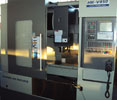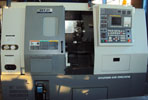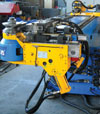

South African manufacturers are holding their own against foreign competition and sometimes even competition from their own government which does not seem to be in favour of supporting quality local products. In addition, the skills issue is a constant challenge local companies have to deal with while looking at expanding their markets.
Hi-Tech Security Solutions asked a few local security manufacturers about how they were dealing with these pressing issues and what they were doing about the potentially lucrative markets in Africa.
Hi-Tech Security Solutions: Do we have the appropriate skills to keep innovating and engineering to be competitive?
Craig Sacks, Turnstar Systems: I believe that due to high levels of crime, South Africa has a global advantage in terms of innovation in the physical security sector. Physical security products used in various environments, such as mines, factories and warehouses, must be designed and manufactured to withstand any amount of punishment. The normal operating environment is testing enough, however, the products must be able to withstand attempted penetration from criminal elements and vandals (of which South Africa has no shortage).
The biggest issue is with R&D, which is the lifeblood of an organisation and people with the right skill sets in the steel fabrication (designs for fabrication) and mechanical/electrical engineering fields are difficult to come by. There is often a pull for qualified engineers to leave the engineering field and enter the business market. Banks and investment banking organisations often hire engineers, as they are able to think out of the box.
Diane Dagnin, iPulse: South Africa still has world-class engineers and innovators. In fact, due to the isolation of the country, first through sanctions, and now through simple distance, most South Africans tend to be more innovative and creative than their European and American counterparts.
Bryan Watson, Inhep Electronics Holdings: Skills are scarce, but this is a global, not a uniquely South African issue. The reality is that good employers, who look after their people, not just financially, but more importantly in terms of work environment and opportunities for growth and personal development, can still attract and retain top talent. We are very focused on ensuring we recruit the best people, and enable them to contribute.
Keith Vieira, FSK: At present, if you look around the security industry and predominantly the manufacturers and designers of security products, you will find it is predominantly people who have been in the industry for some time, 10 to 20 years. I do not see a great deal of young engineers getting involved in the industry and as we know there is a drastic shortage of young engineers in the country. My answer to your question is that we do presently have the skills and innovation to continue, but I believe that it is fast coming to an end. My opinion is that in five years time there may not be that many qualified, experienced engineers working in the security industry. If you look at the rate at which technology is moving worldwide I think that we will require some young engineers out of university with new innovative ideas to keep moving this industry forward. I have doubts that in five years time we will still be a competitive player in the design and innovation of security products.
Bill Young, Saflec: We do have the skills to keep on innovating in the security market and this is because of our intensive education policy which insists that all new members of the staff are obliged to follow a definitive educational path in line with their particular skills that we wish to develop. At present, we have three BTech students and one S3 student.
Ray Wilsenach, Nemtek: Nemtek has the skills it needs and we find their costs are market related.
Adam Butchart, Centurion Systems: Yes, in fact we will sometimes employ more people than we have an immediate need for with the knowledge that we will need their skills for future projects. Our focus is primarily, through innovation, to be competitive by offering products with real value. We believe that we have, through our considerable investment in research and development and manufacturing expertise, built up a formidable team of engineers that are very skilled at delivering innovative solutions.
Chantelle Knott, Sherlotronics: We are still reliant on First World technology and expertise.
Jarryd Smith, Impro Technologies: Yes, as long as we do not grow complacent. We need to keep visiting international markets and products, and striving to not only meet, but exceed expectations. Quality and consistency has been benchmarked by countries like Japan and we need to ensure we are regularly addressing these points.

Hi-Tech Security Solutions: Are our skills appropriately priced?
Diane Dagnin: Good skills cost money. We are certainly not as cheap as India, but our resources are still competitive compared to First World countries. And I believe our work is at least as good as, if not better, than many First World countries.
Bryan Watson: It is possible to run a profitable business using the skills available in SA, so by definition they must be appropriately priced.
Keith Vieira: As the country’s skills levels are reduced and good engineers are head hunted by overseas companies, so their price tag increases. There is a huge difference between a good engineer and an average engineer. Most certainly average engineers will only earn average salaries, but good engineers today are demanding high salaries so you need to pay for quality. In South Africa at this point in time, they are especially sought after.
Bill Young: These skills get more costly for us due to the time off that is required for study and higher salaries, but we are still competitive in the world market
Adam Butchart: No. There is a shortage of skills compared to the relative demand, and therefore they go to the highest bidder pushing up the costs. We are therefore out-priced when compared with up-and-coming manufacturers from markets such as China.
Chantelle Knott: Highly skilled employment is scarce and hence expensive.
Jarryd Smith: Yes. It can be a bit tricky however, when you price yourselves according to the international market where you can quickly out-price yourself in the local market. There needs to be a good balance between price and quality as often price can be perceived as quality to the buyer.
Hi-Tech Security Solutions: What is being done to improve the available skills and make sure there is a new generation of skills on the horizon?
Craig Sacks: Turnstar has been making use of Merseta, which provides vouchers for the use of training. Merseta is supported by all business as every business in a particular sector must contribute 1% of the organisation’s salary and wages every year. Our employees have been trained in technical drawing, engineering shapes, to read and interpret engineering drawings, occupational health and safety and they have been taught to perform routine maintenance on the machinery that they use.
Diane Dagnin: iPulse invests in junior developers all the time, training on the job, and providing industry-based certification in the case of the software developers, through learnerships and vendor training. Our engineers are normally young graduates with a degree, whom we mould in the real world through experience and on the job learning which enables them to take the theory they have learned, and apply it in a practical sense.
Bryan Watson: There are two aspects to this. The first and most important component is growing the capabilities of your existing staff. To do this we have carried out a Skills Gap analysis which has allowed us to focus our attention on the gaps with the intention of up-skilling and creating the next generation by embracing the SETA training programs. We are using learnerships and/or mentorships to develop our staff and where necessary we are sourcing courses or facilitators to deliver our requirements.
The second component is pulling talented young people into the industry. To do this we have a graduate recruitment programme that targets talented young student engineers, mentors them through their degrees and recruits them if their academic performance warrants it.
Keith Vieira: One of the serious problems in this country is the quality and the ability of technicians coming out of university or technikons. There is a drastic skills shortage in this area and most certainly, a good technician is worth his weight in gold and very difficult to find.
Bill Young: We have an ongoing recruitment policy where we are always looking for new talent from the universities to bring forward in our particular areas of interest
Adam Butchart: Not enough is being done to address this. With entry level to mid-level skills we are able, through our dedicated training centre, to up-skill our employees. We are running a successful Adult Basic Education and Training (ABET) programme. However, when it comes to higher levels of skill requirements such as professionals and engineers, we rely on formal institutions and drawing from the scarce pool of skills in the market place. Government should be doing more to drive skills development right from early, school-going ages to feed these resource requirements.
Chantelle Knott: More companies are offering training and internships.
Jarryd Smith: I think it is important not to let engineering talent disappear overseas. We have some incredibly gifted and talented designers and engineers in South Africa and the temptation for them is to seek better income abroad. We need to ensure that we not only encourage them to stay local, but also that we grow them accordingly by letting them explore their creative talents with innovative ideas and products. This freedom will open the window to new products and fresh ideas.

Hi-Tech Security Solutions: What new or innovative manufacturing processes are you using?
Craig Sacks: Turnstar has recently introduced three new state-of-the-art machines to our production facilities. These machines provide high-quality components, which are manufactured to the highest tolerances. The machines are:
1. CNC lathe.
2. CNC machining centre.
3. Robotic welder.
The robotic welder provides high-speed production throughput and carries out the work of five human welders. The robot also does not take a lunch break and never gets tired. Besides the speed, advantage, all welds are consistent and are of an extremely high quality.
Diane Dagnin: iPulse innovates based on customer requirements. Our company is a marketing technology company. We build solutions to real world problems and we design and innovate our products around weaknesses or gaps in the marketplace. iPulse seldom tries to simply emulate or copy what already exists, we always innovate through the creation of solutions rather than products that cater to a broad market need.
Bryan Watson: Production forecasting has been a big driver along with implementing Lean Manufacturing principles to enable us to be competitive using Kanban as well as the seven wastes methodology. We have also adopted a cell manufacture concept with multiskilling being the driver to allow for a flexible reactive manufacturing process.
Keith Vieira: We look towards innovation. I personally spend a great deal of time sourcing new products as well as new manufacturing methods. We will continue upgrading our surface mount line, our quality inspection process as well as our assembly process. Recently we have moved to a system where the manufacture of products is fully computerised and this has obviously improved our quality. We have developed our products to ensure that they can be completely manufactured by a machine and this means that we are less dependent on the human factor. It also ensures that our quality is maintained.
Bill Young: We do not employ any new manufacturing techniques as what we have is adequate. Also, most of our products are not mass produced but are handmade. We are also very conscious of the need for employment at this time and therefore encourage a more hands on approach to satisfy this need. Our hourly paid staff have been with us for many years, some over 25 years, and they train the new younger staff in the way we like things done and thus keep our quality at the highest level.
Ray Wilsenach: CAD, pick-and-place, lead-free soldering.
Adam Butchart: We try to implement automation into our production, for example, through the use of robotics. We also adopt similar policies to much larger manufacturing companies such as Toyota and Microchip. From a human resource/labour force point of view, we are running a productivity initiative called the Workplace Challenge. This initiative is promoted by Productivity SA and endorsed by the Department of Trade and Industry. It is closely aligned with international best practices. We feel that it is ground-breaking for a manufacturing company of our size to have adopted these initiatives and automation technologies.
Chantelle Knott: We are investing in more automation processes to speed up production and improve on quality.
Jarryd Smith: Although South Africa is not yet on the same standards as Europe and America, we are still focusing on being a green company by ensuring our products leave the factory exceeding local and international requirements, such as being lead-free, FCC, CE, UL, RoHS (Restriction of Hazardous Substances) and of course SABS approved.
Hi-Tech Security Solutions: How are you approaching the African market, if at all?
Craig Sacks: The African market is a key region for us. South Africa has an excellent reputation in Africa for being an industrial powerhouse and we are able to ride on that wave. The key issue for foreigners is 'do we trust this supplier' and I believe that South Africa has a very good brand. In the next two years, I see the Nigerian, Kenyan and Ghanaian markets to be key growth countries for us. There are also a number of secondary African markets such as the Congo and Tanzania, which are also important to us.
Diane Dagnin: iPulse currently exports to Botswana, Namibia, Zimbabwe, Kenya and Nigeria through official distributors, and has partners who sell our products in Europe, Asia, the USA and most of East and Western Africa.
Bryan Watson: We have a dedicated export team that spends time with our African customers. We view ourselves as African, and Africa as our home turf, and take it personally when non-African companies beat us to African business.
Keith Vieira: We are well entrenched in the African market and do a great deal of business on the continent. We have found that the African market is growing much faster than the South African market in the areas of security and also its requirement for technology. Africa is a very lucrative market for us, it has proved to be a very interesting as well as a challenging market. We have also found that the level of skills of technicians and engineers in Africa are higher than that of South Africa and therefore it has been a relatively easy path to launch our product into the continent. A great deal of our innovation is geared towards the African market and we see this as a growth point.
Bill Young: Anyone in manufacturing in South Africa who does not realise that the rest of Africa is a proverbial gold mine is not attending to their business. We regularly visit several major countries in Africa and have made more revenue from these visits than we experienced from costly visits to other continents, and we intend to intensify these visits.
Ray Wilsenach: African Exports have been, and will continue to increase.
Adam Butchart: We are participating in regional trade shows and engaging with various role players in an increasing number of African countries. Through visiting these countries, we are better able to understand their local market and attempt to provide solutions tailored to their specific needs. We also drive product training locally where we invite our African trading partners to our dedicated training facility, and also do training for them where they are based.
Jarryd Smith: With the help of our distribution network, we are targeting the likes of universities and the industrial sector where there is a need for large-scale access control solutions with integration benefits. Companies and foreigners are investing in opportunities that are resulting in expansion and growth into Africa and we are striving to make inroads into the rest of Africa with our success and experience gained from within our borders.

© Technews Publishing (Pty) Ltd. | All Rights Reserved.